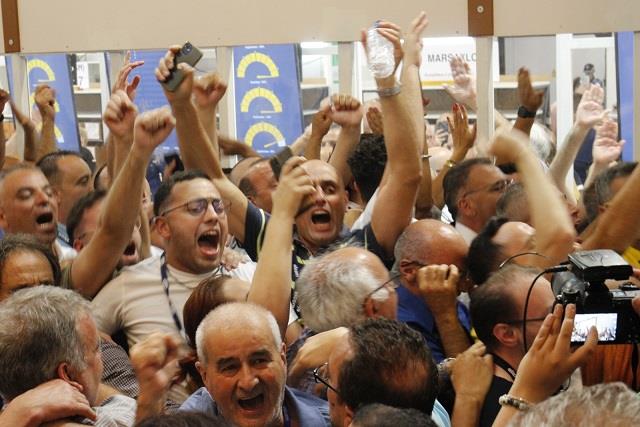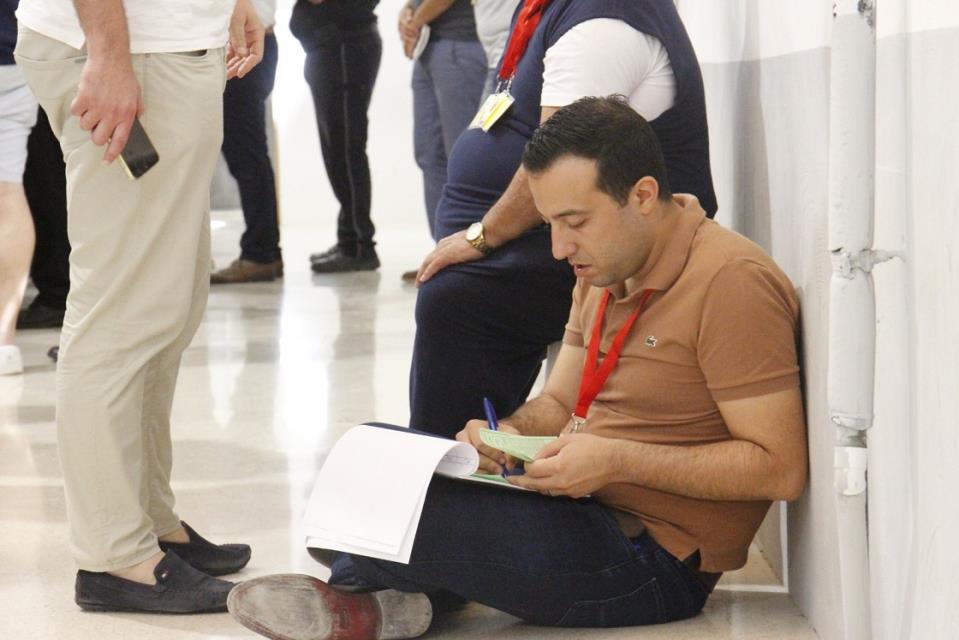The gap between the Nationalist Party and the Labour Party fell by another 9,485 votes when compared to 2019 on the second day of vote counting in Naxxar on Thursday.
The PN had already made up 8,297 votes on the first day of counting on Wednesday, meaning that the party has thus far closed the gap with the PL by 17,782 votes.
The gap with the localities counted so far in 2019 would have been of 41,001 votes – today it stands at 23,219 with the final day of counting upon us today.
The votes for 21 localities were counted on Thursday, including important swing localities San Gwann, Msida, and Birkirkara together with heavy PL strongholds such as Cospicua, Zabbar, and Paola and heavy PN strongholds Sliema and Lija.
In those 21 localities back in 2019, the PL had won 57,169 votes, while the PN won 36,323 votes, leaving a gap of 20,946 votes.
This year in the same localities, the PL won 51,005 votes, while the PN won 39,544 votes, leaving a gap of 11,461 votes – 9,485 votes less than five years ago.
The PN therefore gained 3,221 votes while the PL lost 6,164 votes, with independent candidates again making an impact on the party’s vote tally as well.
PN win the swing localities
Much like Wednesday, the PN registered gains in almost all localities – even in some Labour-leaning localities – while it managed to flip two localities from the PL to their favour, and see another one go to a deadlock situation.
PN sources were initially cautious to speculate what would happen in San Gwann, a locality which Labour has controlled since 2019 and which it had a majority of votes (but not seats) in back in 2013 as well.
But as it turned out, the party had little to worry about as it opened up a gap of 619 votes on the PL and won 54.56% of the vote. That is the party’s best result in the locality since it achieved 55.61% in the 1997 local council election – when the Labour Party did not contest councils.
Msida meanwhile was not necessarily a locality that the PN was expecting to win, but the PL lost 380 votes in the locality amidst a lower turnout, and the PN managed to retain almost all of its votes from 2019 (it lost just 48 votes) and increase its vote share from 44.71% to 48.7%.
This was enough to win the locality back to PN control, as PL’s support dipped to 46.33% - the lowest in 21 years. In fact, it was 21 years ago – in 2003 – that was the last time that the PN won the seat majority in this locality.
Within this context, the PN will probably be a bit disappointed to have not turned Birkirkara back to its control for the first time since 2013. While the PN gained 244 votes here and increased its vote share by 3.84%, PL councillor turned independent candidate Kaylocke Buhagiar was elected at the first count, thereby creating a deadlocked council with 6 seats going to the PN, 6 to the PL, and him as the kingpin.
The positive signs for the PN continued elsewhere: in Marsascala the party gained an impressive 550 votes, increased its vote share by 6.32% and both the new seats in the locality, meaning that it managed to get all 4 candidates elected, while the party gained a further 273 votes, an increase in vote share of 3.49%, and an additional seat off the PL.

Big gains were registered in the Gozitan village of Xaghra as well: the PN gained 559 votes as it increased its vote share by 11.73% and won both the new seats on offer in the locality.
Another big swing came in Pieta, where the PN gained 113 votes but registered an increase in vote share of 11.91% when compared to 2019 as the PL haemorrhaged votes from the locality.
There weren’t many major PN strongholds on offer on Thursday, with just Lija and Sliema falling into that category. There, the PN bolstered its support.
In Lija particularly, the PN gained 122 votes and added 4.78% to its majority, meaning that the party now has the support of 70.83% of those who voted there. That’s the highest level of support since local elections began, and was enough to have a 4-1 seat majority.
In Sliema – a locality which hasn’t taken particularly kindly to the travails within the PN in the past few years – support also increased considerably: the PN gained 292 votes and 7.84% in terms of vote share, to the point that support currently stands at 78.57%.
It wasn’t all positive though: the PN failed to make inroads in the Gozitan village of Gharb, saw its vote share drop slightly in Rabat in Gozo, and created history for the wrong reasons in Cospicua as it failed to even elect a single candidate to the council.
PL continues to drop votes
Beyond making history in Cospicua and gaining some votes in Rabat, Gozo, there was little for the PL to celebrate on Thursday as it lost over 6,000 votes.
Its biggest loss of votes was in Birkirkara: the party here lost 1,631 votes and a 10.58% share of the votes when compared to 2019 as it ceded the majority in the town.
There are some positives that the PL can perhaps take though from this result: the PN only managed to gain 244 out of those 1,631 votes – the bulk of the rest went to independent Kaylocke Buhagiar (who was a PL councillor) as he won 999 votes, and others seemed to abstain rather than to vote for the PN.
No such positives in San Gwann and Msida as the PL lost control of the councils there and lost a cumulative total of 712 votes.
The result in Cospicua, where the PL registered its best ever vote share of 85.54% and managed to win all five of the seats on offer on the council – leaving the PN with nothing – will give some hope that the vote of the PL diehard is still very firmly with the party, although the party did lose 293 votes owing to a lesser turnout.
85.54% is the highest vote share recorded in any local council election, in any locality ever since both the PN and the PL began contesting councils together. Only in 1998, when the PN registered 88.42% of the votes in the Swieqi local council, was a higher majority in a locality seen. But the PL did not contest those elections, meaning that the PN was competing against independent candidates.

That’s around about where the good news ends for the PL in its heartlands though, as it dropped votes – and seats – in a number of its core localities.
The party lost 440 votes in Fgura (majority dipped by 2.49%), 227 votes in Marsascala (majority dipped by 7.07%), 201 votes in Marsaxlokk (majority dipped by 14.27%), 456 votes in Paola (majority dipped by 3.77%), 104 votes in Kalkara (majority dipped by 3.46%), and 536 votes in Zabbar (majority dipped by 3.49%).
In Marsascala, the PL failed to win either of the two new council seats on offer; in Zabbar, the PL lost a seat to the PN; and in Marsaxlokk, the PL lost a seat to independent candidate Matthew Bugeja.
Support also dissipated in Pieta as the PL lost 636 votes – equivalent to a mammoth 17.95% drop – when compared to 2019. The party retained control of the council with a 51.44% majority, but that pales in comparison to the 69.39% majority that the party had in 2019.
Going into the final day of counting where there appear to be more PN-leaning localities on offer, where important swing localities such as Mosta and Siggiewi are up for grabs, and where – if trends persist – the PL’s majority in Gzira could also be under threat due to mayor Conrad Borg Manche now contesting as an independent, the PL may be bracing itself for more votes to be lost and for its gap to the PN to shrink further.